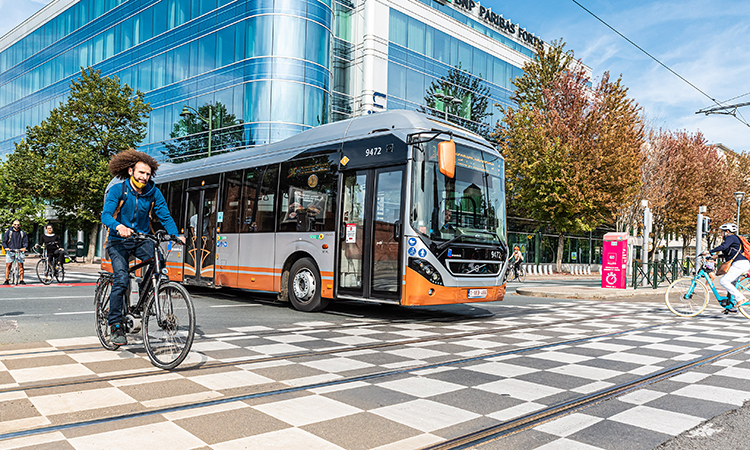What does the future of public transport look like?
- Like
- Digg
- Del
- Tumblr
- VKontakte
- Buffer
- Love This
- Odnoklassniki
- Meneame
- Blogger
- Amazon
- Yahoo Mail
- Gmail
- AOL
- Newsvine
- HackerNews
- Evernote
- MySpace
- Mail.ru
- Viadeo
- Line
- Comments
- Yummly
- SMS
- Viber
- Telegram
- Subscribe
- Skype
- Facebook Messenger
- Kakao
- LiveJournal
- Yammer
- Edgar
- Fintel
- Mix
- Instapaper
- Copy Link
Posted: 18 January 2023 | Mohamed Mezghani - International Association of Public Transport (UITP) | No comments yet
The public transport industry has experienced an unprecedented level of development in recent years, due to a varying number of factors – whether it be the COVID-19 pandemic and the climate change emergency or, more recently, the energy and cost-of-living crises. In response to these events, in addition to many other influences, the industry has made a conscious effort to continuously innovate in order to best support and serve its passengers – and this trend is not set to end any time soon.
For the first instalment in a new online exclusive feature series focusing on the future of the public transport industry, Mohamed Mezghani, Secretary General of the International Association of Public Transport (UITP), takes the opportunity to consider the challenges that the industry is currently facing, and discusses how public transport’s response to these challenge will influence its future development.


I am always interested when asked to consider where public transport currently stands, and where it may be going next.
I’m an optimist when it comes to my own sector, and I am more than happy to accept an opportunity to address its future.
Of course, we cannot look to the road ahead, without first considering what currently exists around us.
The importance of collaboration and community
When I think of the next steps for our industry, I think of the need to be resilient. I think of regular redefinition to provide a better sector. How do we stay resilient? What must be done to continually progress? Collaboration is key to all of that, and public transport must be seen as a strategic priority on the agenda of decision makers across the globe.
Public transport must be seen as a strategic priority on the agenda of decision makers across the globe”
A sector is only as strong as those who exist within it. And, in public transport, we say that it is defined by its strength of community. This was never more evident than during the past few years, with the impact of the COVID-19 pandemic. We saw fallen ridership, reduced financial incomes and a lack of political support. But the sector showed its resilience and strength, with the dedication of the staff working within it every single day.
After all, public transport is a people-centric sector. Built around people, and for the people. No matter the challenges, it should always be the beating heart of our cities.


Rising to the challenge
Although an essential part of our cities – and a solution to many issues – public transport is no different than other sectors when it comes to current challenges. In fact, the challenges that society is facing are also impacting public transport. Whether that is the ongoing battle for action on climate change, the energy crisis impacting millions of people, labour shortages across sectors or the rise in inflation causing economical harm.
Public transport is and will remain the backbone of urban mobility… Fulfilling this role means being available and affordable for all who use it”
Public transport is and will remain the backbone of urban mobility. But it will go beyond station-to-station and serve people door-to-door by embracing shared and on-demand mobility. Fulfilling this role means being available and affordable for all who use it. But the current energy crisis and the issue of increasing inflation both have major consequences for the local public transport sector – which, of course, then impacts the mobility of citizens and the fight against climate change. These issues exist at a time when we must urgently reduce the emissions of transport.
Increasing energy costs
The energy supply to public transport companies should be seen as a priority in case of a shortage”
When it comes to increasing energy prices, the sector has responded by accelerating this very energy transition. First, by being a sustainable alternative to car-based mobility, and then by adopting clean and zero-emission fuels. It must be considered as a sector of strategic importance. As a result, public transport should receive the support required to face these energy bills and the insurance that it makes a major contribution to our economic and social lives.
The energy supply to public transport companies should be seen as a priority in case of a shortage, and national leaders should remain in a dialogue with public transport stakeholders to identify required measures at the local level.
Recovering from the pandemic
Despite ongoing efforts to bring back passengers, ridership has not yet reached pre-pandemic levels”
Throughout the pandemic, essential services were kept running, even with fare revenues and ridership numbers falling. Despite ongoing efforts to bring back passengers, ridership has not yet reached pre-pandemic levels, mainly due to the fact that people have adopted work from home policies during weekdays. The sector is making strong efforts to return ridership to previous highs, which is improving greatly in some cities; but still at lower levels in others. However, ridership on weekends has exceeded 2019 levels in many cities, showing that people need public transport.
Workforce shortages
We must rally those experienced voices within [the industry], to best showcase the appeal of working in public transport”
Staff shortages are also a global concern, not only when it comes to drivers. Digitalisation and customer orientation imply new skills and job profiles. To best address this, we must rally those experienced voices within it, to best showcase the appeal of working in public transport. We can do this by asking sector leaders to share their experiences and strategies on how to present the sector as an employer of choice. UITP is very well placed to bring those voices together to work on this approach and strengthen the public transport brand to attract new talents.
These sector trends also go hand-in-hand with the development of public transport fares and fare structure. Public transport must be well funded, and financially resilient. But we must also address the developing trends.


An essential sector should receive essential support
We know that public transport makes our cities better. It contributes to providing cleaner air, healthier surroundings, more space, less cars and better living for all. It carries, as a sector, an important weight on its shoulders. However, even though public transport is an essential tool in the building blocks of urban life, it does not always receive the political and financial backing that it should.
Even though public transport is an essential tool in the building blocks of urban life, it does not always receive the political and financial backing that it should”
When you have a contributing solution on your doorstep to the climate crisis, to the energy crisis, to the demand for more space, and to the ongoing issues of congestion, to road safety, to health, it is essential to invest in that solution and to continually advance its cause.
As an association, UITP knows how important public transport is to urban living. Our members in more than 100 countries advocate every day to advance the sector. But we must not assume that our message is heard in all corners – we must take up opportunities such as this one to spread our message to a wider audience!
The future is bright
Resilience is key, strategy is vital and public transport must be recognised as a priority at the decision-making level”
What does the future of public transport look like? It is a sector facing its challenges head on and redefining itself for the years ahead. That future is a bright one. There are issues to consider, and conversations to have, but the people who make public transport what it is – those who work in it, and those who use it – can rely on the sector to deliver. Resilience is key, strategy is vital and public transport must be recognised as a priority at the decision-making level.
By facing these challenges, we can build a stronger, more resilient sector. One that is fit for the future, and available for all.


Related topics
Accessibility, Air Quality, Alternative Power, COVID-19, Mobility Services, On-Demand Transport, Passenger Experience, Public Transport, Sustainable Urban Transport, The Future of Transport Series, Ticketing & Payments, Traffic Management, Transport Governance & Policy, Workplace
Related organisations
International Association of Public Transport (UITP)
Related people
Mohamed Mezghani








